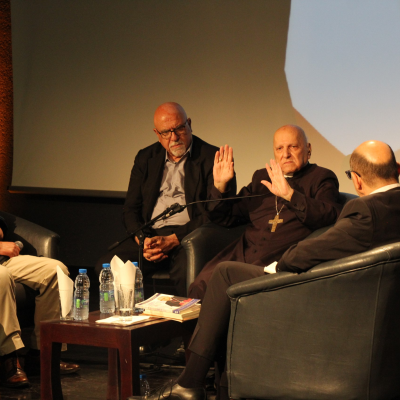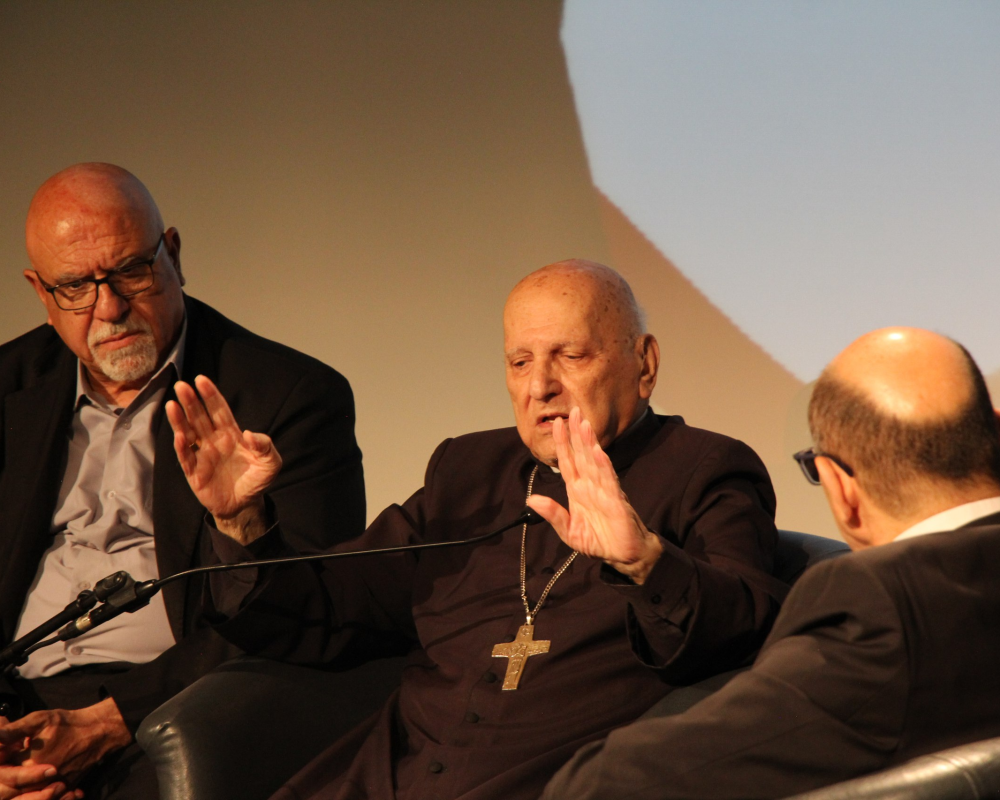
Bethlehem/PNN/
On the occasion of his 90th birthday and in recognition of his ideas, work, and just positions in the pursuit of peace and justice for the Palestinian people, the Palestinian Christian Initiative “ Kairos Palestine” organized a dialogue seminar with His Beatitude Patriarch Michel Sabbah, former Patriarch of Jerusalem.
During the symposium, Patriarch Sabah talked about his experiences and work. He also sent messages to the Palestinian people in order for them to prevail in their just cause, as the most important messages were clinging to hope and steadfastness on the ground.
Patriarch Michel Sabbah to PNN: Israel's injustice increases, denies our existence, but our message is to remain steadfast.
Patriarch Michel Sabbah stated in an interview with the Palestinian News Network (PNN) that his message is a message of hope and perseverance, as we face challenges year after year, since the Palestinian Nakba 75 years ago.
He told PNN Editor-in-Chief Monjed Jadou that the situation deteriorates, and Israel's injustice increases, openly stating that we do not exist and that the entire land belongs to them. Therefore, there must be a practical response to this Israeli arrogance.
Patriarch Sabbah explained that we respond to these Israeli policies with a message of hope and existence, asserting that we exist by the power of God, and we will remain as long as we desire and as long as hope remains within us.
Patriarch Sabbah emphasized that the greatest form of resistance is perseverance and hope, meaning that one should never lose hope no matter how difficult life becomes. He addressed Palestinian youth, urging them to be patient, resilient, and to work towards opening paths in life, no matter how challenging, while keeping hope alive within themselves and others.
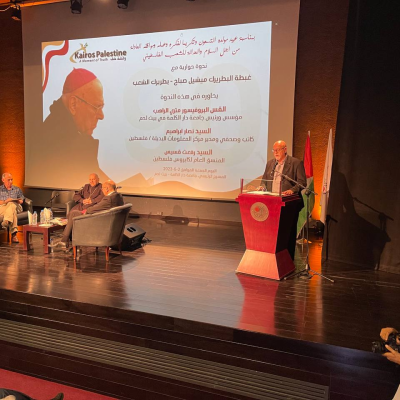
Our people are united with a shared history.
Regarding how to deal with and advise our people in dealing with emerging national, sectarian, and religious identities due to divisions in Palestine and the Arab world, Sabbah said at the beginning of my service in Palestine, everyone knows that the Palestinian people are diverse, Muslims and Christians, all of them are Palestinians. They have been and still are in a state of conflict with the Israeli occupation, and this is the reality we have dealt with.
Sabbah further stated that in this history, we must recognize the positives. There is a common history for the people of Bilad al-Sham (Greater Syria) who spoke Aramaic, then Roman, then Greek, and later Arabic and Islam entered the land of Bilad al-Sham, where a portion of the people embraced Islam, while some remained Christians. But all of us were and still Aramaic Arabs, and we all belong to the land of Bilad al-Sham. We have experienced the same trials and languages, leading to the Arabic language.
He also pointed out that another positive factor in our society is the abundance of brotherhood and friendships that have formed both today and in the past. He mentioned that in the past, Europe did not accept Christians, while Islam allowed them the freedom of worship under the law of dhimma, which was a positive law at the time, protecting Christians. Today, we are all Palestinian citizens, and we are all equal under a multi-religious Palestinian system that treats everyone equally.
Extremism is a Western-made industry aimed at serving occupation and colonization.
Regarding the phenomenon of extremism, Sabbah stated that despite progress, there is some Islamic extremism, but it is not representative of Islam or Muslims. It is a political extremism that has become a tool in the hands of Western policymakers who have become the driving force. He cited the example of ISIS, which is a Western creation that emerged after the occupation of Iraq, and Western politicians used it to create a new Middle East that divides and disrupts Arab and Eastern societies. This was done after we were born under the Sykes-Picot Agreement, in which the British promised King Abdullah the first of Jordan that he would be the king of all Arabs. However, they were planning to divide the country to create a place for Israel in the future, and this is exactly what happened.
"Patriarch Sabah referred in his response to the interviewers' questions to Israeli extremism and the presence of an extremist far right-wing government. He pointed out that the source of extremism is Western policies that try to exploit religion for the sake of extremist interests and visions. The international community does not hold Israel accountable for its crimes, and that is why we see an increase in extremism in Israeli society.
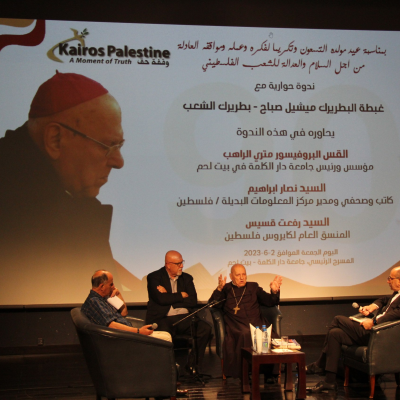
The First Intifada: The early days and the first sermon calling for justice
Patriarch Sabah also spoke about his assumption of the patriarchate during the early days of the First Intifada 1987. There were demands not to organize celebratory events and ceremonies and to enter the Church of the Nativity in informal attire due to the Intifada and the martyrs, at the request of the people of Bethlehem. However, due to the circumstances, this proposal was rejected, and it was decided to continue with the regular entrance. However, he decided to deliver a sermon, which was not part of the Christmas celebrations.
He added in that time, 'I don't know how Israel found out that I would deliver a sermon in the church outside the usual program. Israeli officers contacted Rome, and Rome called me informing me to do as I please, and if I succeed, we all succeed, but if I fail, I fail alone.' Indeed, I delivered the speech in which I spoke about the blood of the land's children and demanded that Israeli authorities grant people their freedom and stop the injustice. It had a significant echo on the international level, and the midnight Mass sermon became a yearly tradition for the Patriarch.
We united with the heads of churches to reject injustice and killing
He also addressed the messages of the Council of Church Unity, which broke its silence afterward. After that, the heads of churches came together in meetings, and we decided to issue a statement. We did not intervene in politics, but we intervened in the lives of people who are being killed to stop killing, and Israel responded by asking me to stay out of politics. However, I refused because I believe that if any person is tortured and killed, it is my duty to speak up for them, and that's how we continued.
Meeting with Sheikh Yassin and the late Yasser Arafat despite the occupation's objections
Regarding his meeting with Sheikh Ahmed Yassin, Patriarch Sabah said that he decided to meet with him and announced it along with other religious figures. Before the meeting took place, senior Israeli intelligence officers met with me and asked me not to meet him. I told them that they defend their people, and I defend mine and humanity. I defend the Palestinian people and the oppressed people, and I informed all the officials in Israel not to be oppressors. I told them that I would go to Gaza to meet Sheikh Ahmed Yassin, and we informed them that the bombings bring criticism to the Palestinians. He responded that Palestinians do not love death, but it is the occupation that forces us into this reality at that time.
He also mentioned the meeting with the late President Yasser Arafat, which was a good and exciting meeting. During our presence at the presidential headquarters in Gaza, they informed him that we were with Hamas, but he did not comment and continued his dialogue with us without addressing the meeting with Hamas.
Resistance is our duty as Palestinian Christians and Muslims, united
Regarding his opinion on resistance, Patriarch Sabah said that the Palestinian Christian is a citizen, and he has a duty. Resistance is part of the duties of all Palestinians, and he emphasized the importance of not remaining spectators while others sacrifice themselves. It is necessary to engage in all forms of Palestinian resistance according to one's ability and specialization.
Dialogue between religions needs to reach the level of citizens on the ground.
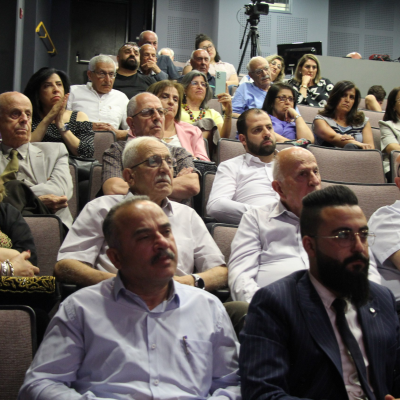
Regarding interfaith dialogue and coexistence, Patriarch Sabah stated that the dialogue should be based on the understanding that we are one people. He emphasized that the dialogue should include believers from different religions. He pointed out that the problem lies in the fact that this dialogue is limited to certain groups and does not reach the grassroots level. It should involve discussions between elders, monks, and politicians who need to sit together and engage in dialogue. He also stressed the importance of bringing the dialogue to the grassroots level because people live together, and there are good and not-so-good individuals among them. Therefore, we need to educate society and raise awareness. He explained that the responsibility lies with the state in schools, mosques, and churches. He called upon all religious leaders, intellectuals, and officials to promote dialogue that serves the interests of all Palestinians and emphasizes love and understanding.
The Jews we struggle against are colonizers, not genuine Jews.
Patriarch Sabah emphasized that the Jews we struggle against today and who occupy our land came from outside. He mentioned that there were Jews with a small population living among us in the past, coexisting with Muslims and Christians. However, they are not the Zionists who currently occupy our land. He called upon the Jews to follow the path of God, the path of love, and not the path of war and aggression, which Zionist movements exploit.
The promise of Palestine as God's land is not true.
He asserted that in the name of God, there are no wars, occupations, captives, or torture. He emphasized that the words of God are about love and peace, not occupation, killing, tanks, and airplanes. He stressed that the claim of the Jews that God promised them this land is not true. War and killing are not the creations of God but of humans. He stated that if the Jews took our land, we would not let them take away the Holy Scriptures.
In the conclusion of the meeting, a discussion was opened, and attendees spoke about various social and political issues, such as education, unifying Christian holidays, and the Patriarch's perspective on the unification of these holidays.
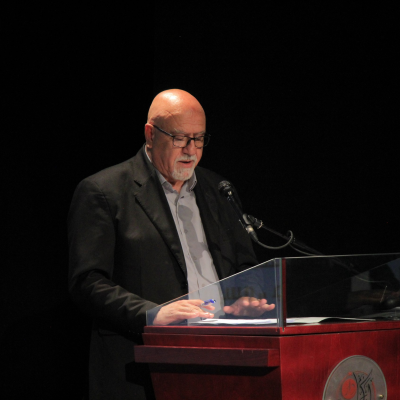
There is no such thing as the Abrahamic religion, and it's a deception to the Arabs.
Patriarch Sabah also affirmed that there is no such thing as the so-called Abrahamic religion. He pointed out that the occupation, supported by the United States, aims to convince Arabs to adopt this religion in order to pass colonial plans that serve Israel's interests. He emphasized that selling land to the occupation is not permissible and goes against the sincerity to our people. It would strengthen Israel's hold over us as Palestinians, and it is forbidden.
At the beginning of the seminar, Rifat Odeh Kassis , the General Coordinator of Kairos Palestine, welcomed the attendees and introduced the Patriarch. He spoke about his personality, his stages of service, and his prominent contributions to serving the people and the Palestinian cause as a religious figure with a local and global vision and influence.
Kassis presented Patriarch Sabbah, highlighting his character, resilience, tolerance, and the values he embodies, noting that his ethics align with the ethics of Christ. He symbolized resistance to risks and fears, and he was capable of making difficult decisions, presenting a strong and influential model. It was emphasized that Patriarch Sabbah is an exemplary figure to be followed because he has been and still is the patriarch of the people, being a religious and national institution. Therefore, this dialogue seminar is organized to benefit from his experience and pass it on to society and future generations.
He emphasized that the dialogue with Patriarch was conducted in a way that allows us to benefit from his culture, experience, and theology, and also to benefit and educate future generations. For this reason, specific topics were selected with a high level of intellectual and cultural content, aiming to extract the best experiences of the Patriarch in order to transmit them to our people and future generations.
Kassis said :" we are documenting the thought and heritage of the Patriarch, whose role is undeniable and one of the most important Palestinian pillars. He stressed the importance of releasing and discussing the thought, so that everyone can benefit from it".
Nassar: The occupation seeks to divide us, while Patriarch Sabah's vision unifies our people.
Nassar Ibrahim, a journalist and director of the Alternative Information Center, who was one of the interlocutors of Patriarch Sabah, stated that this meeting with His Eminence Patriarch Michel Sabah, with his history, work, and rich experience, is essential for us to benefit from the accumulated knowledge of this influential figure intellectually, culturally, and religiously. He is a significant personality in local and international theology, and it is necessary to invest in his rich experience to educate future generations, enabling them to deal with and answer the questions faced by our people in light of the contradictions and conflicts caused by various factors.
Nassar emphasized that if we do not benefit from the role of this influential figure, who carries weight and influence, as Palestinians, we will lose a part of the experience we face under the various forms of Israeli targeting.
Father Mitri Raheb : Sabah teaches us that resilience is resistance and not losing hope is resistance.
Mitri Raheb, Public Figure, Pastor and Theologian, Author and Social Entrepreneur affirmed that Patriarch Sabah's experience is rich, as he gave us today the essence of ninety years in ninety minutes. In his seminar, he focused on general concepts, the most important of which is that every Palestinian person, whether Christian or Muslim, is a human being, and we are all Palestinians with no distinction among us. He emphasized the issue of citizenship and that we are all equal, with no one being superior to the other.
The Patriarch also emphasized in his message that resistance is related to steadfastness and holding onto the land, not losing hope, and not emigrating. Rather, it is about building a state of citizenship and a future where every citizen has equal dignity.
Raheb said that comprehensive dialogue and details from Sabah's ninety-year life presented at this seminar in ninety minutes.
